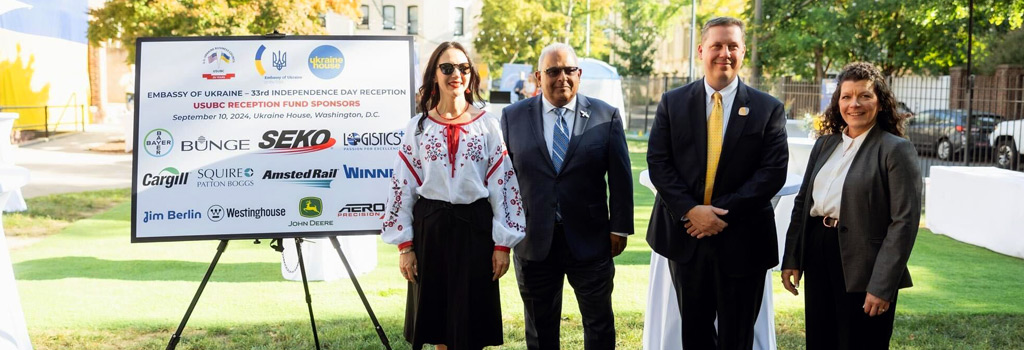Featured Galleries USUBC COLLECTION OF OVER 160 UKRAINE HISTORIC NEWS PHOTOGRAPHS 1918-1997
 Holodomor Posters
Holodomor Posters

UKRAINE: OVERVIEW OF THE NEW TAX CODE
 RULG - Ukrainian Legal Group
RULG - Ukrainian Legal Group
Kyiv & Wash, D.C., Tue, Dec 7, 2010
KYIV/WASHINGTON, D.C. - The following is an overview of the new tax code in Ukraine recently passed by the Parliament and signed by President Yanukovych on December 2, 2010 and published December 4, 2010. Most of its provisions will come into force on January 1, 2011.
I. ADOPTION PROCESS
In November 2010 the Verkhovna Rada (Parliament) of Ukraine adopted the Tax Code (“the Code”) - one of the most anticipated documents in Ukraine’s history.
Wide-scale protests by small and medium size businesses against substantial limitation of the simplified tax system in the Code resulted in a Presidential veto of the Code on 30 November 2010. The President proposed amendments which kept the simplified taxation system in its current state, restricted the new powers of the tax authorities and improves some of the Code provisions from the point of view of the business community.
On 2 December 2010 the Verkhovna Rada re-adopted the Code accepting all amendments proposed by the President. The Code was signed by the President and then published on 4 December 2010. Most of its provisions will come into force on 1 January 2011, with certain provisions to be enacted at other specific dates specified in the Code.
II. GENERAL KEY POINTS
Corporate profit tax:
The general rate will gradually decline from 25% to 23% in 2011, 21% in 2012, 19% in 2013 and 16% in 2014. A 0% rate applies to insurance companies’ profit from long-term life and retirement insurance activity. A 0 to 20% rate applies to foreign entities with income sourced from Ukraine, depending on income source type.
With some exceptions, the accrual principle is prescribed for recognizing revenues and expenses.
For accounting and amortization purposes the classification of depreciable fixed assets was enhanced (16 assets groups instead of 4), with minimal amortization periods established for most groups. An intangible assets classification was introduced, providing for amortization throughout the period of validity of rights.
The Code includes a detailed list of tax deductible expenses, and a list for which deductibility is limited or denied. Excluded from tax deductible expenses are payments (for goods and services) to individuals-entrepreneurs who use simplified tax system. Deductibility of royalty payments and payments for services to non-residents is limited as described below.
Limited Deductibility of Royalty and Service Payments to Non-Residents:
The Code limits deductibility of royalty payments to non-residents to an amount not exceeding 4% of income (revenues) received from the sale of products (goods, works, services) received during the year that precedes the reporting year (exclusive of value added tax and excise tax). This limitation does not apply to:
(i) royalty payments to permanent establishments of non-residents in Ukraine which are taxed in Ukraine;
(ii) payments made by businesses in the sphere of television and radio broadcasting according to the Law of Ukraine "On Television and Radio Broadcasting"; and
(iii) payments for the right to use copyright and related rights to motion pictures produced abroad, as well as to musical and literary works.
In addition to the above, royalty payments made to non-residents will not be deductible where:
(1) a non-resident receiving such payments has off-shore status (a);
(2) non-resident receiving such payments is not a beneficiary of such royalty payments (except in cases when the beneficiary granted the right to receive the payments to this non-resident);
(3) royalties are paid in respect of intellectual property that initially belonged to a Ukrainian resident (i.e. in case the rights to such intellectual property are first owned by a Ukrainian resident, then transferred to a non-resident and are then licensed to a Ukrainian resident);
(4) a non-resident receiving royalty payments is not subject to taxation in respect of such royalties in the country of its residency.
The Code also limits deductibility of payments to non-residents for consulting, marketing and advertising services to the amount not exceeding 4% of income (revenues) received from sale of products (goods, works, services) received during the year that precedes the reporting year (exclusive of value added tax and excise tax).
If the service payments are made to permanent establishments of non-residents in Ukraine which are subject to taxation in Ukraine, this limitation does not apply. In cases where a non-resident receiving such service payments has off-shore status, the whole amount of the payments is non-deductible.
Value Added Tax (VAT):
The VAT rate will be decreased from the current 20% to 17% commencing 1 January 2014. The taxpayer’s right to record VAT credit is limited to 365 days following the date of the VAT invoice. The reporting period (up to the 20th of the month) as well as period for VAT payment (10 working days) remain unchanged.
Personal Income Tax:
Ukrainian tax resident individuals (b) are taxed at a 15% rate on worldwide income. A graduated tax rate is introduced – if an individual’s income exceeds 10 minimal wages (one minimal wage currently equals 922 UAH or 115,25 US Dollars), the difference is taxed at 17%. Certain personal income, e.g. royalties, dividends are taxed at 5%.
The non-resident tax rate on personal Ukrainian source income is same as the resident tax rate.
Real-estate tax:
Commencing in 2012, this new tax must be paid by legal entities or individuals depending on the size of the living area of owned residential real-estate. Legal entities pay the tax on a quarterly basis, individuals – once a year. Non-residential premises (company-owned factories, etc.) are not subject to this tax.
III. SPECIAL TAX APPROACHES
Simplified Tax System:
The President’s amendments excluded most of the limitations of the simplified tax system imposed by the originally adopted Code. Therefore the current simplified tax system largely remains in effect.
Tax Holidays:
Tax holidays (0% profit tax rate) are introduced as of 1 April 2011 until 1 January 2016 for companies incorporated after 1 April 2011, or to previously incorporated companies, within defined limits of yearly turnover, activity types and number of personnel. Additionally, their employees’ average salary must be not less than 2 minimal wages a month.
In addition, companies engaged in certain types of activity, e.g. aircraft construction, ship building, are exempt from profit tax until 2015 irrespective of the turnover or number of employees.
Enforcement Specifics:
Tax authority enforcement powers for non-compliance were enhanced.
Transitional provisions:
(1) all corporate profit tax regulations shall be valid since 1 April 2011;
(2) fines for infringing tax legislation from 1 January 2011 to 30 June 2011 shall not be higher than 1 UAH (12 US cents);
(3) transitional periods to full amounts of certain types of taxes are established (e.g. 3 years for the ecological tax);
(4) some operations are temporarily exempt from VAT, e.g. import and supply of certain engines for production and consumption of biofuel – till 2019, specific operations performed in printing industry, space engineering spheres – till 2015.
DISCLAIMER
The content of this Legal Alert is not legal advice, but a general informational summary of the law. Resource to qualified legal counsel is always required for legal advice.
FOOTNOTES:
(a) The list of off-shore territories is determined by the Cabinet of Ministers of Ukraine (and may be amended from time to time), and includes jurisdictions considered to be tax havens and generally used for tax-planning purposes. Ukrainian tax law provides for certain disincentives in respect of dealings with residents of such jurisdictions.
(b) The definition of a Ukrainian resident individual in the Code did not change compared to current tax legislation. A Ukrainian resident individual is an individual who has a residence in Ukraine. Subject to different criteria, a foreign individual can be considered a Ukrainian tax resident. In practice, however, only foreigners who stay more than 183 days in Ukraine and are duly registered with the relevant tax authority may benefit from Ukrainian tax resident status.
CONTACT: RULG - Ukrainian Legal Group, Olimpiysky Center, 72, Velyka Vasylkivska Street Suite 14, Kyiv 03150 Ukraine; Phone: [380] (44) 207-1060; Fax: [380](44) 207-1064; Washington, D.C. 20007, USA, Phone: [1] (202) 338-1182; Fax: [1] (202) 338-4237; link; www.rulg.com.
NOTE: RULG - Ukrainian Legal Group is a member of the U.S.-Ukraine Business Council (USUBC), Washington, D.C., www.usubc.org

















